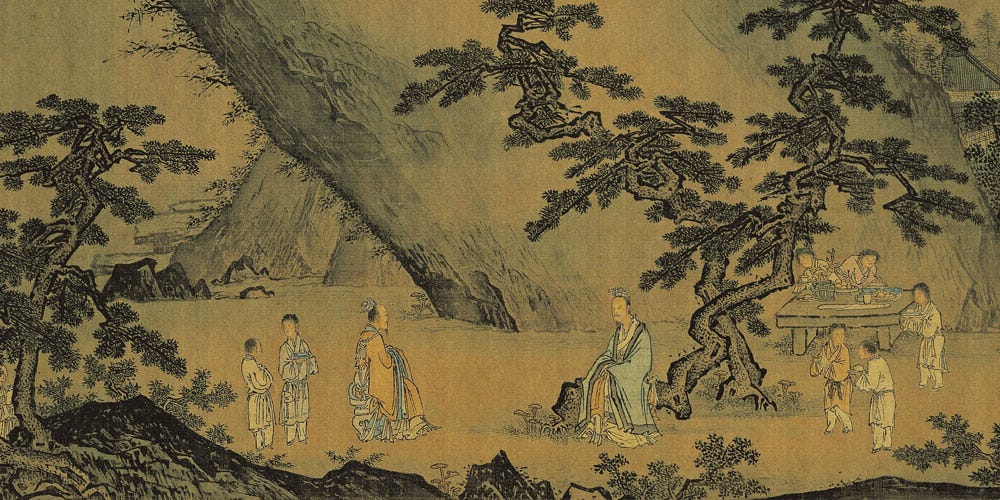The Way: Ruling by Emptiness and Stillness
By: Han Fei (韩非, c. 280–233 BCE), Legalist Philosopher
The Way is the beginning of all things, the measure of right and wrong.
Thus the enlightened ruler guards the beginning, to know the source of all things;
he maintains the standard, to see the root of success and failure.
Therefore he waits in emptiness and stillness:
commands arise by themselves, affairs settle of themselves.
By emptiness he discerns the truth of the real;
by stillness he discerns the rectitude of what moves.
Those who speak reveal themselves through their words;
those who act reveal themselves through their deeds.
When deed and word match, the ruler has nothing further to do but return to their reality.
道者,万物之始,是非之纪也。是以明君守始以知万物之源,治纪以知善败之端。
故虚静以待,令名自命也,令事自定也。虚则知实之情,静则知动者正。
有言者自为名,有事者自为形,形名参同,君乃无事焉,归之其情。
Thus it is said:
When the ruler reveals what he desires, ministers will shape themselves to please him;
when the ruler reveals his mind, ministers will parade their differences.
Therefore: remove likes and dislikes, and ministers show their plain selves;
remove prejudices and cleverness, and ministers make themselves complete.
故曰:君无见其所欲,君见其所欲,臣自将雕琢;
君无见其意,君见其意,臣将自表异。
故曰:去好去恶,臣乃见素;去旧去智,臣乃自备。
Thus, possessing wisdom, he does not scheme, so all things find their place.
Possessing worth, he does not act, but observes what ministers rely on.
Possessing courage, he does not give way to anger, but lets ministers fully exhaust their martial strength.
Therefore: discarding cleverness, he yet has clarity;
discarding worthiness, he yet achieves merit;
discarding courage, he yet becomes strong.
When officials hold to their duties, and offices keep their order,
each is employed according to his ability—this is called “constancy of practice.”
故有智而不以虑,使万物知其处;
有贤而不以行,观臣下之所因;
有勇而不以怒,使群臣尽其武。
是故去智而有明,去贤而有功,去勇而有强。
群臣守职,百官有常,因能而使之,是谓习常。
Thus it is said:
Silent, he holds no visible position;
still, none can grasp his place.
The enlightened ruler does nothing above,
and the ministers below stand in awe.
The Way of the enlightened ruler is this:
He lets the wise exhaust their thought, and then he uses it to decide matters—
thus he is never at a loss for wisdom.
He lets the worthy marshal their talents, and then he employs them—
thus he is never at a loss for ability.
Merit accrues to the ruler when ministers labor; blame falls to ministers when there are faults—
thus the ruler is never at a loss for reputation.
Therefore, without himself being worthy, he becomes the teacher of the worthy;
without himself being wise, he becomes the standard for the wise.
The labor belongs to the ministers, the success belongs to the ruler.
This is what is called the constant principle of the worthy sovereign.
故曰:寂乎其无位而处,漻乎莫得其所。
明君无为于上,群臣竦惧乎下。
明君之道,使智者尽其虑,而君因以断事,故君不穷于智;
贤者勑其材,君因而任之,故君不穷于能;
有功则君有其贤,有过则臣任其罪,故君不穷于名。
是故不贤而为贤者师,不智而为智者正。
臣有其劳,君有其成功,此之谓贤主之经也。
Context
This passage from the “The Way” (Zhu Dao 主道) chapter of Han Feizi sets forth the Legalist vision of rulership. The Way (Dao) is described not in mystical but in political terms: it is the root of order, standards, and right and wrong. The ideal ruler governs by stillness and detachment, concealing his desires so that ministers cannot manipulate him. He refrains from personal cleverness, virtue, or courage, instead making use of the capacities of others while keeping the merit as his own. This embodies the Legalist principle of wu wei (non-action) in politics—not moral withdrawal, but strategic restraint that keeps the ruler inscrutable and secure.
Author
Han Fei (韩非, c. 280–233 BCE) was a prince of the Han state and one of the most systematic thinkers of the Legalist school during the Warring States period. A student of Xunzi, he combined rigorous logic with a realist view of human nature and politics. His writings, collected as Han Feizi, argue that law (fa), technique (shu), and authority (shi) are the true foundations of stable rule, not Confucian virtue or persuasion. Admired even by his rival Qin, Han Fei was ultimately forced to take poison at the order of Li Si. His works deeply influenced the Qin dynasty’s unification of China, and his sharp, unsentimental vision of power has remained central to Chinese political philosophy.
✺ Keep Chinese Wisdom Flowing
Every post here is free—no paywalls, no ads—because I believe classical Chinese wisdom should be accessible to everyone. Chinese Wisdom Express is a one-person labor of love, built on hours of researching, translating, editing, and curating timeless quotes, stories, and reflections.
If you’ve enjoyed what you read here, please consider supporting my work with a kind donation. Even a small gesture helps keep this space alive and open for all.
✦ Donate Here → https://buymeacoffee.com/jianxu
With gratitude,
Jian



This is a good one...thanks much.